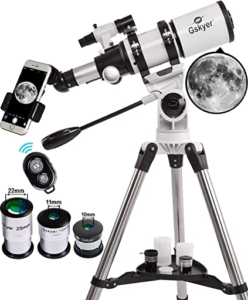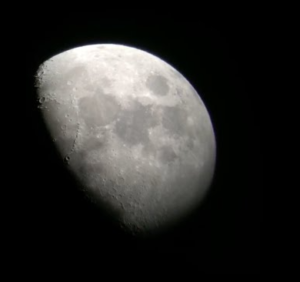GSkyer Telescope 80mm AZ Refractor

GSkyer 80mm AZ Refractor is an entry-level scope with an 80 mm short focal length. Lightweight and compact size have made it a grab n go telescope. As a beginner scope, it will give fair views at this price range though with some flaws. For better views, you may need to add some accessories too.
Advantages and Disadvantages of GSkyer 80mm AZ Refractor
Advantages
- Stable mount.
- Lightweight and portable.
- High-quality views with multi coated optical glass
- Adjustable steady mount.
Disadvantages
- Focuser loosens alignment.
- No user instruction manual.Technical Specifications of GSkyer 80mm AZ
Optical Assembly
- 80 mm achromatic refractor with a focal length of 400 mm.
- High-quality optics with a little chromatic aberration.
- A 48-degree diagonal is perfect for daytime use.
- Three Kellner-type eyepieces work fairly well.
Mount
- Solid and stable mount.
- The adjustable tray locks the legs of the tripod and increases stability.
- Vixen-style dovetail
- The handle enables easy tracking.
- 6 X30 magnifying finder
Accessories of GSkyer 80mm AZ Refractor Telescope
- Phone adapter and Bluetooth Remote
- 3 x Barlow lens
- 6*30 finderscope
- 3 x Barlow lens
- 3 Eyepieces (25mm, 10mm, 5mm)
- Telescope optical tube
- Stainless steel· tripod stand·
- Zenith mirror
- Accessory tray
What can you see with GSkyer 80mm AZ?
- The Moon and its details.
- The phases of Venus and Mercury.
- Ice caps of Mars.
- The Great Red Spot and the moons of Jupiter.
- Saturn’s rings.
- Globular clusters like M 13, and nebula like M 42
Astrophotography Example with GSkyer 80mm AZ Refractor Telescope

Photo: Astrophotography with GSkyer 80mm AZ Refractor Telescope (Ref: ytimg)
Alternative Options To GSkyer 80mm AZ Refractor
There are some other options at a similar price range.
- Celestron AstroMaster 130EQ: Newtonian reflector with advanced features.
- Orion Astroview 90mm: Larger focal length.
